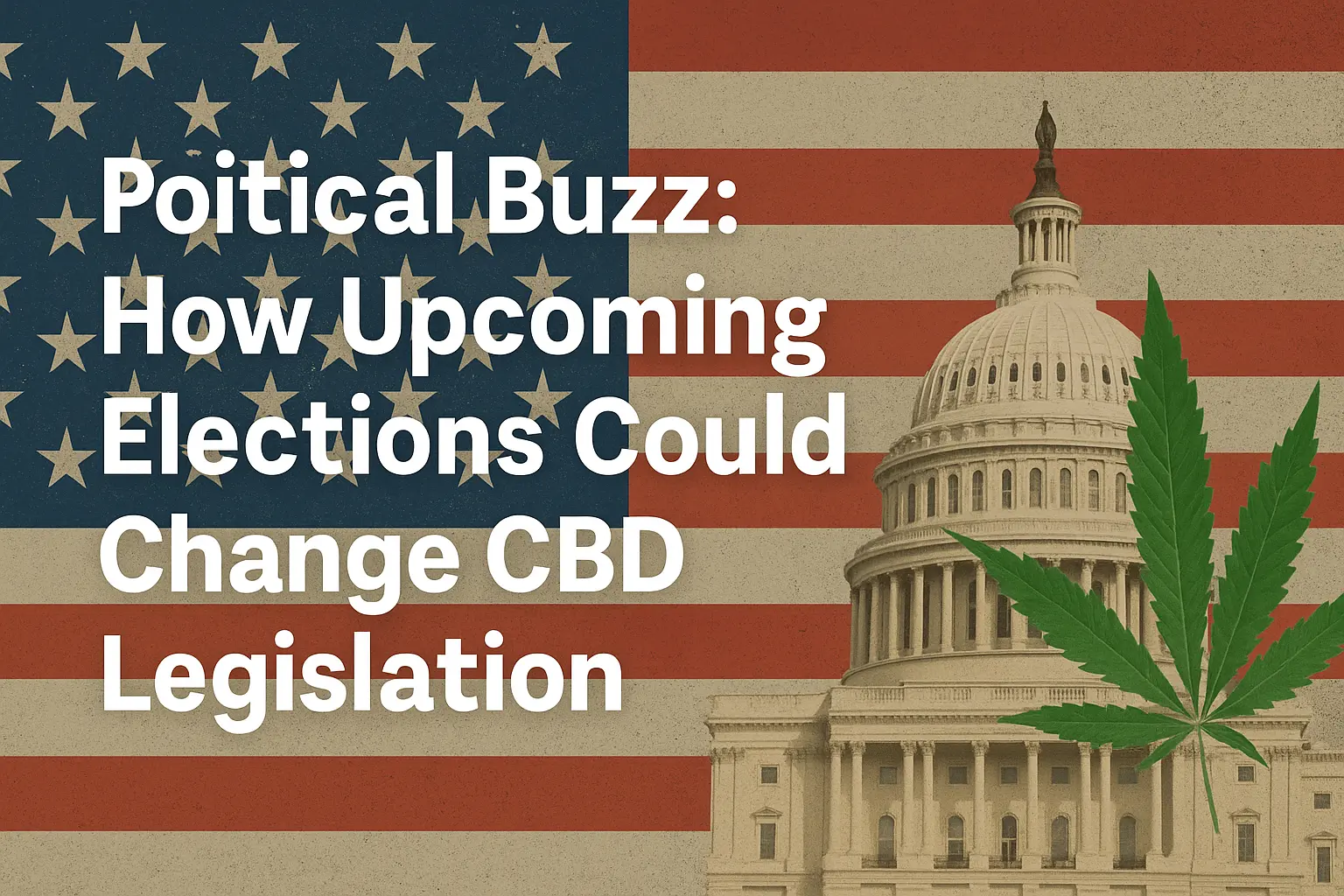
Introduction : Why Elections Matter for CBD
Elections don’t just decide who sits in government — they decide how agencies interpret and enforce the laws that shape entire industries. For CBD, elections influence whether your favorite product becomes more widely available, better regulated, or suddenly restricted. For businesses, elections can mean smoother market entry with clear rules, or overnight disruption because of a new administration, Congress, or state legislature.
CBD isn’t just about wellness anymore — it’s about politics, lobbying, court battles, and public opinion. That’s why the upcoming elections matter more than ever for the future of hemp and CBD.
Where CBD Stands Today
Before looking forward, here’s where CBD sits right now:
-
Federal baseline in the U.S.: Hemp and hemp-derived CBD were legalized by the 2018 Farm Bill, provided THC content remains at or below 0.3%. This legalization allowed the explosion of CBD businesses across the country. However, it did not create a clear regulatory path for CBD in food and supplements.
-
FDA stance: The FDA has repeatedly stated that existing frameworks for dietary supplements and foods are not suitable for CBD. The agency has issued numerous warning letters to companies making unapproved health claims or selling unsafe products.
-
State patchwork: States have filled the gap with their own rules. Some states have built comprehensive CBD frameworks; others heavily restrict or ban hemp-derived cannabinoids, especially those with intoxicating effects like delta-8.
-
International perspective: The UK and EU classify CBD as a “novel food,” requiring companies to go through an approval process before selling products legally. Provisional safety limits have been proposed in the UK, while EU-level decisions continue to affect the broader European market.
This patchwork of laws and uncertainty means elections will directly shape whether CBD becomes more normalized or more restricted.
How Elections Change CBD Law — The 7 Channels to Watch
1) Congress & National Lawmaking
Control of Congress determines what legislation moves forward. With CBD, this includes:
-
Farm Bill amendments that could redefine hemp or its derivatives.
-
Standalone bills to regulate CBD supplements.
-
Spending bill riders that can quietly restrict hemp products without passing a new law.
Committee chairs — especially Agriculture, Energy & Commerce, and Appropriations — play a huge role in whether pro-CBD or anti-CBD measures advance.

2) The White House & Regulatory Appointments
The President appoints agency heads who run the FDA, USDA, and Department of Justice. Each administration sets the tone:
-
A pro-business administration may encourage a fast regulatory pathway for CBD.
-
A more cautious administration may double down on enforcement and safety reviews.
Regulatory priorities can swing dramatically depending on who wins the White House.
3) State Governments & Ballot Initiatives
State-level politics often move faster than federal policy. Governors, legislatures, and ballot measures decide whether CBD products are available in stores, how they’re tested, and whether hemp-derived THC variants are restricted.
In some states, voter-led ballot initiatives have legalized cannabis outright, creating ripple effects for CBD. In others, legislatures have cracked down hard on hemp-derived cannabinoids. Elections at the state level may bring sudden changes in availability and compliance costs.
4) Appropriations & Riders (The “Quiet” Path to Regulation)
Congress often attaches “riders” to appropriations bills that redefine hemp or restrict CBD sales. These riders can be buried in large spending bills that pass at the last minute.
For CBD businesses, this is one of the biggest risks — because change can happen almost overnight without debate or media attention.
5) Courts & Litigation
Presidential elections shape the courts over the long term. Judges interpret statutes, rule on regulatory authority, and decide challenges brought by CBD companies or trade associations. A single court ruling can redefine what’s legal nationwide.
6) Public Opinion & Campaign Messaging
Elections amplify narratives. If campaigns portray CBD as a wellness supplement for responsible adults, momentum grows for normalization. But if politicians spotlight safety issues (like minors buying delta-8 products in gas stations), public opinion may shift toward tighter rules.
The way CBD is framed during campaigns has a direct influence on the laws that follow.
7) International Trade & Diplomacy
Elections also affect trade policy. International markets like the EU and UK already impose stricter CBD rules, requiring safety testing and authorization. Governments can negotiate trade deals or align regulations, affecting how easily U.S. hemp and CBD products can be exported abroad.
Real-World Examples — How Politics Has Already Shaped CBD
-
2018 Farm Bill: This single piece of legislation transformed hemp into a legal crop and created the modern CBD industry. Without that political decision, there would be no mainstream CBD market.
-
FDA inaction: Despite legalization, the FDA has refused to treat CBD as a normal food or supplement ingredient, creating uncertainty. The lack of clear rules has kept major retailers cautious and allowed a gray market to flourish.
-
Appropriations fights: Riders proposed in Congress have already sought to narrow what counts as hemp derivatives, threatening parts of the hemp-derived market.
-
UK and EU rules: International regulators have treated CBD as a novel food, forcing companies to comply with complex authorization processes. That’s a political decision that changes which companies survive in those markets.
Sweet or Harsh: The Outlook for Different Groups
Consumers
-
Sweet: Elections that favor clear rules mean safer, better-labeled products and broader access.
-
Harsh: Elections that tilt toward restriction can ban certain products or create a confusing patchwork of rules.
Small Hemp Farmers & Startups
-
Sweet: Pro-agriculture policies and clear CBD frameworks support small businesses.
-
Harsh: New restrictions or redefinitions of hemp could wipe out entire product categories.
Big Brands & Retailers
-
Sweet: A stable federal regulatory pathway unlocks mainstream distribution through national chains.
-
Harsh: Political uncertainty makes big retailers cautious — and they may pull CBD products off shelves if regulations suddenly shift.
Public Health Advocates
-
Sweet: Elections can lead to funding for safety studies and clearer packaging rules.
-
Harsh: Fear-driven campaigns may lead to overregulation that doesn’t match actual science.

What Businesses Should Do Now
-
Monitor elections closely — track which lawmakers sit on key committees.
-
Engage in lobbying — support trade associations that advocate for CBD businesses.
-
Plan for state variance — build compliance strategies for your most important state markets.
-
Stay flexible with products — design formulations that can be adapted if rules suddenly shift.
-
Build legal resilience — budget for compliance and potential legal challenges.
-
Prioritize transparency — maintain certificates of analysis and avoid risky marketing claims.
What Voters & Consumers Should Watch
-
Proposed Farm Bill amendments.
-
Any new FDA guidance or pathways for CBD in supplements/foods.
-
State-level ballot measures on hemp or cannabis.
-
International developments in the UK and EU.
FAQs
Q: Can a single election ban CBD overnight?
Not exactly — but spending riders or emergency state laws can quickly restrict product classes.
Q: Is CBD federally legal in the U.S.?
Yes, hemp-derived CBD is legal under the 2018 Farm Bill, but its use in foods and supplements is still in a gray zone.
Q: How do UK and EU rules affect CBD sellers?
They treat CBD as a novel food, requiring companies to apply for authorization and comply with strict safety limits.
Final Blunt Take — Sweet & Harsh Reality Check
-
Sweet: Elections that bring supportive lawmakers could finally give CBD a stable, regulated future. Consumers get safer products, businesses get certainty, and the market goes mainstream.
-
Harsh: Elections that politicize CBD as a youth-safety or law-and-order issue could spark new restrictions, bans on hemp-derived THC products, and a more fragmented industry.
The reality? The future of CBD is not just about science or wellness — it’s about politics. Elections will decide whether CBD becomes an everyday wellness product sold in every store, or a restricted niche that struggles under constant uncertainty.



